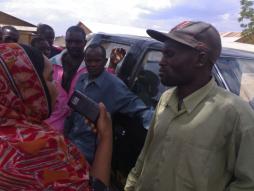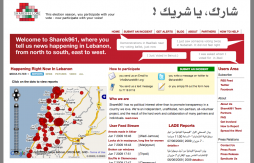citizen participation
Posted by AnneryanHeatwole on Jun 15, 2011
When it comes to water, every drop counts. When a local waterpoint malfunctions or dries up, it’s important to get the problem resolved as quickly as possible. That’s where Maji Matone, a water monitoring and civic participation project in Tanzania, comes in.
Run by Daraja, a Tanzania-based NGO, Maji Matone asks villagers to report outages in their water systems via SMS. Daraja employees read through the SMSs, then pass along the information to the local district engineer. The project is currently being piloted in three different districts. Each district has a local engineer responsible for the water infrastructure. If reports continue to come in and no action has been taken, Maji Matone turns to its media partners in order to publicize the lack of action.
| Maji Matone: Using Mobiles For Local Accountability (and Flowing Water) data sheet 4742 Views |
| Countries: |
Tanzania
|
Posted by MarkWeingarten on Jan 26, 2011
Technology for Transparency data sheet 2235 Views
Author:
Sasaki, David, Renata Avila, Sopheap Chak, Jakub Górnicki, Rebekah Heacock, Victor Kaonga, Sylwia Presley, Manuella Maia Ribeiro, Namita Singh, Carrie Yang
Abstract:
The World Wide Web and the movement for transparency and accountability in government have grown up together over the past two decades, though often in parallel, and with little research evaluating the role and potential of online technologies to bring about greater transparency, accountability and civic engagement. This report is the culmination of four months of research examining the objectives, challenges, successes and effects of online technology projects that aim to promote transparency, political accountability and civic engagement in Latin America, Sub-Saharan Africa, Southeast Asia, South Asia, China and Central & Eastern Europe.
A team of eight regional researchers documented a total of 37 case studies of relevant technology projects. Though this report contains only executive summaries of each case study, full interviews including audio podcasts and related documents, are available on our website.1 In addition to the in-depth case studies, we have also documented over 30 project listings, which provide basic descriptive information and context about related projects. This report is structured in three sections.
The introduction examines the differing aspects between traditional watchdog journalism and online media that rely on raw data sources, often directly from government websites. The introduction also aims to contextualize the benefits of transparency, accountability and civic engagement from a grassroots, networked perspective.
The second section of the report consists of regional overviews authored by each of our eight researchers. These overviews document the history of the good governance movement in each region, the role of technology in promoting transparency and accountability, and summaries of the case studies they documented. The concluding section groups case studies thematically in order draw out trends, conclusions and recommendations that apply across a number of projects.
Posted by MohiniBhavsar on Jun 29, 2010
Networked Activism data sheet 2238 Views
Abstract:
The same technologies that groups of ordinary citizens are using to write operating systems and encyclopedias are fostering a quiet revolution in another area - social activism. On websites such as Avaaz.org and Wikipedia, citizens are forming groups to report on human rights violations and organize email writing campaigns, activities formerly the prerogative of professionals. This article considers whether the participatory potential of technology can be used to mobilize ordinary citizens in the work of human rights advocacy.
Existing online advocacy efforts reveal a de facto inverse relationship between broad mobilization and deep participation. Large groups mobilize many individuals, but each of those individuals has only a limited ability to participate in decisions about the group’s goals or methods. Thus, although we currently have the tools necessary for individuals to engage in advocacy without the need for professional organizations, we are still far from realizing an ideal of fully decentralized, user-generated activism.
Drawing on the insights of network theory, the article proposes a model of “networked activism” that would help ensure both deep participation and broad mobilization by encouraging the formation of highly participatory small groups while providing opportunities for those small groups to connect with one another. Drawing on a series of interviews with human rights and other civil society organizations, the article recommends specific design elements that might foster a model of networked activism. The article concludes that although online activism is unlikely to replace some of the functions served by human rights organizations, efforts to create synergies between traditional and online efforts have the potential to provide avenues for real, meaningful, and effective citizen participation in human rights advocacy.
Posted by KatrinVerclas on Jun 07, 2009
Sharek961 is another effort in Lebanon to monitor the election there today on June 7. Unlike LADE which uses more than 2,000 trained volunteer election monitors to systematically report from polling stations throughout the day, Sharek961 aims to get ordinary Lebanese citizen to text, call, and email in incidences from polling stations, crowdsourcing the conduct of the critically important election there.
According to Sharek961's press release,
"Sharek961.org [is[... empowering citizens to report in Arabic and in English, through four means; SMS, email, Twitter and web reports. Reports can address anything election-related happening around the country, from political rallies and polling queues to vote-buying and violence. Sharek961 anonymously publishes these reports alongside news reports, blog posts, photos, videos and tweets, on an interactive map, making them publicly available to all citizens, media outlets, and organizations."
Sharek961 notes that it
Posted by KatrinVerclas on Jun 05, 2009
Lebanon will hold a critically important parliamentary election on June 7, and election observers from around the world have descended on the country. However, as in many other countries now, there are local organizations and citizen efforts on the ground that are using mobile technology for sophisticated election observation efforts. The Lebanese Association for Democratic Elections (LADE) and the Coalition Libanaise pour l’Observation Elections (CLOE), for example, have put in place an extensive SMS reporting system, for example. LADE will deploy a total of 2,500 volunteer citizen observers throughout the country directly at the 5181 polling stations.


